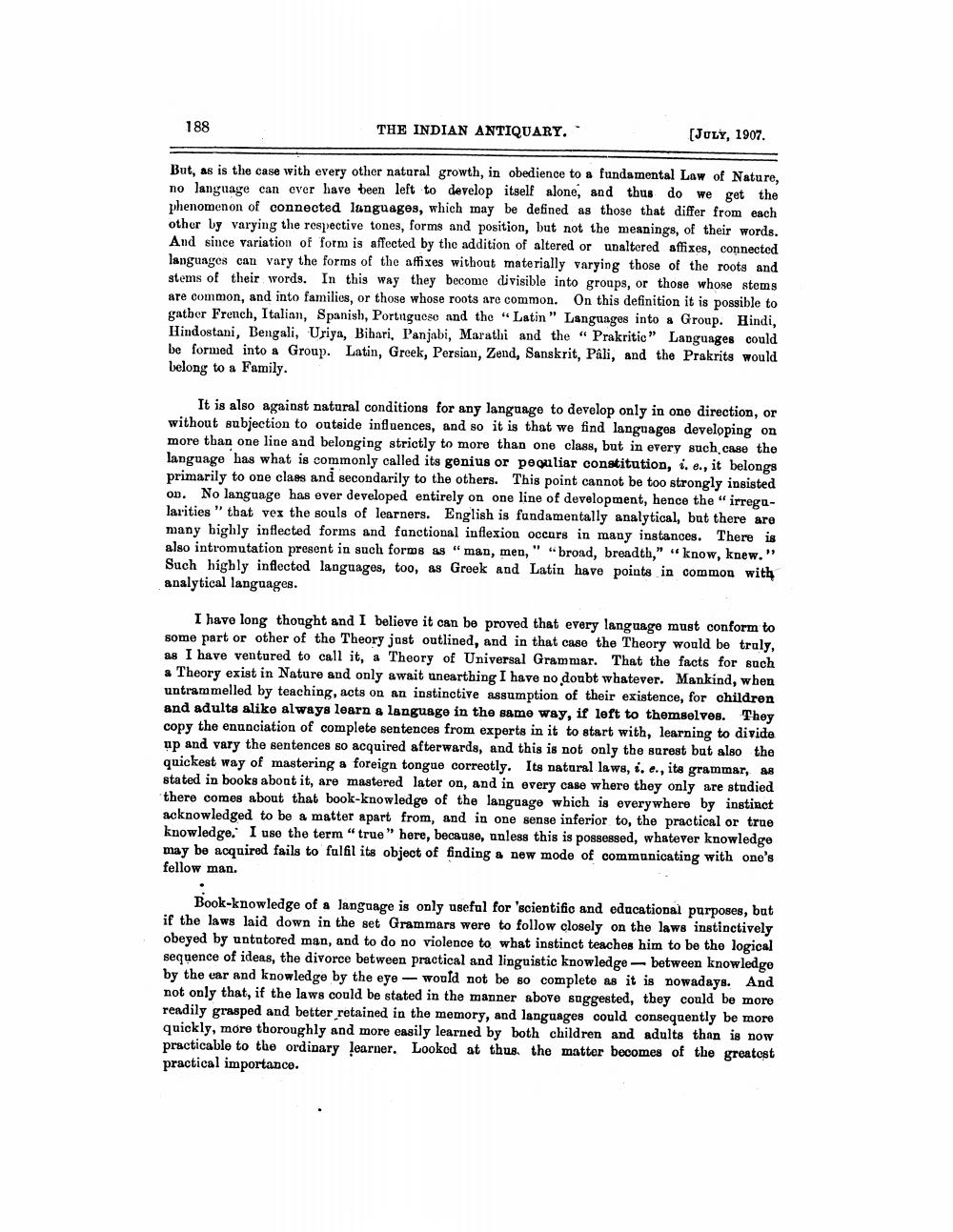________________
188
THE INDIAN ANTIQUARY. -
(JULY, 1907.
But, as is the case with every other natural growth, in obedience to a fundamental Law of Nature, no language can ever have been left to develop itself alone, and thus do we get the phenomenon of connected languages, which may be defined as those that differ from each other by varying the respective tones, forms and position, but not the meanings, of their words. And since variation of form is affected by the addition of altered or unaltered affixes, connected languages can vary the forms of the affixes without materially varying those of the roots and stems of their words. In this way they become divisible into groups, or those whose stems are common, and into families, or those whose roots are common. On this definition it is possible to gather French, Italian, Spanish, Portuguese and the Latin " Languages into a Group. Hindi, Hindostani, Bengali, Uriya, Bihari, Panjabi, Marathi and the “ Prakritic” Languages could be formed into a Group. Latin, Greek, Persian, Zend, Sanskrit, Pâli, and the Prakrits would belong to a Family.
It is also against natural conditions for any language to develop only in one direction, or without subjection to outside influences, and so it is that we find languages developing on more than one line and belonging strictly to more than one class, but in every such case the language has what is commonly called its genius or populiar constitution, s. e., it belongs primarily to one class and secondarily to the others. This point cannot be too strongly insisted on. No language has ever developed entirely on one line of development, hence the “irregalarities " that vex the souls of learners. English is fundamentally analytical, but there are many highly inflected forms and fanctional inflexion occars in many instances. There is also intromutation present in such forms as "man, men," "broad, breadth," "know, knew." Such highly inflected languages, too, as Greek and Latin have points in common with analytical languages.
I have long thought and I believe it can be proved that every language must conform to some part or other of the Theory just outlined, and in that case the Theory would be truly, as I have ventured to call it, a Theory of Universal Grammar. That the facts for such a Theory exist in Nature and only await unearthing I have no doubt whatever. Mankind, when untrammelled by teaching, acts on an instinctive assumption of their existence, for children and adults alike always learn a language in the same way, if left to themselves. They copy the enunciation of complete sentences from experts in it to start with, learning to divide up and vary the sentences so acquired afterwards, and this is not only the surest but also the quickest way of mastering a foreign tongue correctly. Its natural laws, i, e., its grammar, as stated in books about it, are mastered later on, and in every case where they only are studied there comes about that book-knowledge of the language which is everywhere by instinct acknowledged to be a matter apart from, and in one sense inferior to the practical or true knowledge. I use the term "true" here, because, unless this is possessed, whatever knowledge may be acquired fails to fulfil its object of finding a new mode of communicating with one's fellow man.
Book-knowledge of a language is only useful for 'scientific and educational purposes, but if the laws laid down in the set Grammars were to follow closely on the laws instinctively obeyed by untatored man, and to do no violence to what instinct teaches him to be the logical sequence of ideas, the divorce between practical and linguistic knowledge between knowledge by the car and knowledge by the eye - would not be so complete as it is nowadays. And not only that, if the laws could be stated in the manner above suggested, they could be more readily grasped and better retained in the memory, and languages could consequently be more quickly, more thoroughly and more easily learned by both children and adults than is now practicable to the ordinary learner. Looked at thus, the matter becomes of the greatest practical importance.




